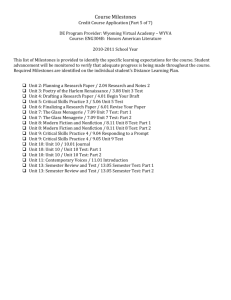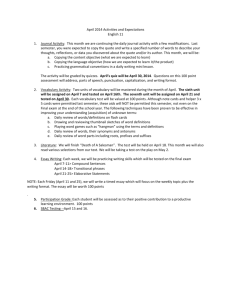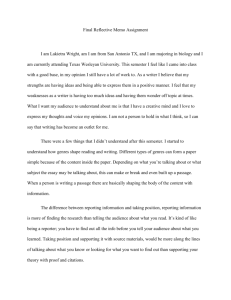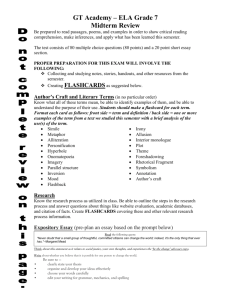Guide_Syllabus_Engl_2xx_CW
advertisement
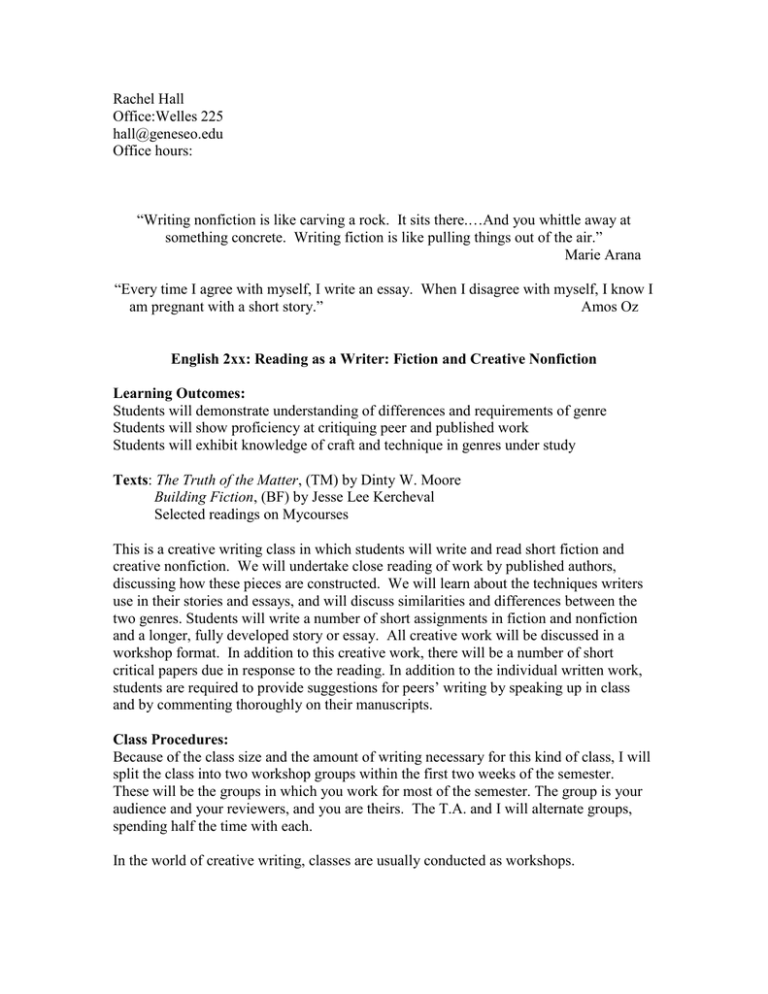
Rachel Hall Office:Welles 225 hall@geneseo.edu Office hours: “Writing nonfiction is like carving a rock. It sits there.…And you whittle away at something concrete. Writing fiction is like pulling things out of the air.” Marie Arana “Every time I agree with myself, I write an essay. When I disagree with myself, I know I am pregnant with a short story.” Amos Oz English 2xx: Reading as a Writer: Fiction and Creative Nonfiction Learning Outcomes: Students will demonstrate understanding of differences and requirements of genre Students will show proficiency at critiquing peer and published work Students will exhibit knowledge of craft and technique in genres under study Texts: The Truth of the Matter, (TM) by Dinty W. Moore Building Fiction, (BF) by Jesse Lee Kercheval Selected readings on Mycourses This is a creative writing class in which students will write and read short fiction and creative nonfiction. We will undertake close reading of work by published authors, discussing how these pieces are constructed. We will learn about the techniques writers use in their stories and essays, and will discuss similarities and differences between the two genres. Students will write a number of short assignments in fiction and nonfiction and a longer, fully developed story or essay. All creative work will be discussed in a workshop format. In addition to this creative work, there will be a number of short critical papers due in response to the reading. In addition to the individual written work, students are required to provide suggestions for peers’ writing by speaking up in class and by commenting thoroughly on their manuscripts. Class Procedures: Because of the class size and the amount of writing necessary for this kind of class, I will split the class into two workshop groups within the first two weeks of the semester. These will be the groups in which you work for most of the semester. The group is your audience and your reviewers, and you are theirs. The T.A. and I will alternate groups, spending half the time with each. In the world of creative writing, classes are usually conducted as workshops. This class will be a combination of workshops and class discussion, and students will have responsibilities for both. We will have regular readings from the assigned texts, which will provide inspiration and serve as models for assigned writing. The texts provide good how-to advice and will clarify and illustrate the assignments. Students are expected to read all assigned materially carefully and actively. As a reader of peer work, you will again need to read closely and carefully, writing comments in the margins or asking questions, marking interesting details, observations, etc. At the end of the poem or story, write a summary of your ideas, offering suggestions about which areas need improvement and additional work. You should sign your comments and hand back the work to the author after the workshop has discussed it. From time to time, I will collect your comments. It is important to recognize and celebrate success, but we do a disservice to both writer and reader if we do not also point to weaknesses. For the workshop to run smoothly, you will be expected to turn in your work with sufficient copies, already stapled and collated at the beginning of class the day that it is due. When your work is being discussed, be sure that you have a copy so you can follow the comments easily. You will want to take notes as the group discusses your writing. During the discussion it is best if the author refrains from speaking--from answering questions, defending or explaining their work--since this will affect some member’s willingness to offer honest criticism. And really, the writing needs to stand on its own. Each exercise that is workshopped will have a “guardian,” that is, someone within the workshop who will lead the discussion, ask important questions, and make sure that the work is examined thoroughly and wisely. As a guardian, you are expected to facilitate the discussion; you needn’t summarize the exercise or list its strengths or weaknesses. Instead, try to get the group to address these issues. Assignments, Deadlines, and more... All written work must be typed and double-spaced with a 12 point font. You will be responsible for providing copies of your work for the members of your group. Please keep track of the balance in your printing account so you are not caught unable to print out copies on your due date. If the cost of copying is prohibitive, please see me and we can make other arrangements. While all work must be turned in to receive a passing grade, late work will not be workshopped and will significantly lower your grade. The exercises you turn in are first drafts, while they should be free of spelling errors and grammatical mistakes (i.e. not rough drafts), they won’t be finished products. Think of them as works-in-progress. I won’t grade them until you’ve revised and reworked them, though I will comment on them throughout the semester. We will also spend time in class discussing revision strategies. In lieu of a final exam, you will turn in a final project. This will include a revision and extension of one of your previous assignments. The final piece should be between 10 and 20 pages. A writer’s statement should accompany your final piece. In this 2-3 page essay, you should discuss how the final piece would be changed if it were written in the other genre. What would need to be crafted differently? What obstacles would you face? What would have been easier, but perhaps less satisfying? Revision is, as Adrienne Rich writes, “the act of reseeing and rediscovering” the significance and purpose of your writing. The workshop supplies you with 13 critics whose feedback will suggest ways to improve your writing. Not all the ideas will be useful every time, but consider each carefully. A finished story or essay takes many drafts. You should be revising throughout the semester; if you wait until the very end of the semester, it will show in the quality of your final piece. I will expect to see that you have taken risks as you revised and that the writing has matured as a result of the readings and workshops. Response papers Response papers are due in class on the day the work is being discussed and will not be accepted late or by email under any circumstance. Responses should be typed, doublespaced and no longer than two pages. Put your name in the upper right hand corner and staple multiple pages as necessary. You should write about both essays or stories assigned. You might compare the use of setting (or characterization or language, etc.) You might determine which essay or story you like better and explain why it is successful, using the critical language introduced in TM or BF. Comparison is not necessary. You may look at entirely different aspects in the two readings. I’m looking for specific comments about the writing techniques employed. How did the author do what he/she did? Why is it effective? What allows it to work here? Here are some additional questions to get you thinking as a writer: What creates the tension in this piece of writing? Why is the piece interesting? What makes me read on? If I lose interest, why? When am I fully transported, and how does this happen? How does the writer hook me? What are the patterns or repetitions within the piece of writing? What am I paying attention to? What am I seeing differently? Where does the writer start the piece, end the piece? Why there? Class Attendance: In order for this class to run smoothly each of us must make a commitment to come to every class, to be here on time, and to participate in discussion each and every class period. Your group will depend on you to turn your work in on time and to read their work thoughtfully. If one person fails in their civic duty, the entire workshop suffers. You are also expected to attend the readings and literary events noted on this syllabus. Please make the necessary arrangements now, so you can participate. Grading: I am happy to discuss your progress with you throughout the semester, but you will not receive grades on individual assignments. In fact, you will not receive a grade until your fully developed story or essay is turned in at the end of the semester. We are working on process here rather than product. If I were to give your first draft a C+, more than likely you would be discouraged, upset, maybe even angry at me for overlooking your genius. None of these responses will help you write a better second draft or a brilliant third or fourth or fifth draft, and that is what we are after. If this uncertainty is going to make you uncomfortable and grouchy, you may want to reconsider taking this class. Please note that I will not discuss grades via email at any point during the semester. You will be graded on class participation/civic duty, including written and oral comments during workshops =40% Your final essay or story will be graded on its ambition, complexity, intelligence, sophistication and improvement=60% Week One: Class introduction Discuss genre differences and requirements Read Chapt 1 and “Memoir? Fiction? Where’s the Line?” in TM, Cheryl Strayed’s “The Love of My Life” “Where He’s Calling From” and “Lenny Dying, Pacific Standard Time” (Mycourses), /Response paper due Week Two: Same material, different genre Discuss “Where He’s Calling From” and “Lenny Dying, Pacific Standard Time,” “The Burial” and “The Procedure”(Mycourses)/response paper due Week Three: Exploring Creative Nonfiction: Writing Scene Discuss Chapters 2 and 3 and “Biography of a Dress” and “Out There” in TM Assignment # 1 due with copies for workshop Discuss workshop procedures/ Practice workshop Week Four: Workshop Assignment #1 Discuss Chapter 4 and “Mirrorings” and “The Drama Bug” in TM Week Five: Writing Exposition Discuss Chapter 5 and 6 and “What They Don’t Tell You about Hurricanes” and “Somehow Form a Family” in TM Response paper due Week Six: Workshop Assignment #2 Week Seven: Exploring Fiction: Story Openings Discuss Chapters 1 and 2 in BF, “The Harvest” and “Notes to Q” (Mycourses) In class writing exercise Response paper due Week Eight: Point of View Discuss Chapter 3 and 4 in BF, “Madagascar” and “Separating” (Mycourses) Response paper due Visiting Writer to Class Reading at 7pm in Sturges Auditorium (required) Week Nine: Workshop Assignment #3 Week Ten: Character and Plot Discuss Chapters 5 and 6 in BF, and “Dimension” and “A Good Man is Hard to Find” (Mycourses) Response paper due Week Eleven: Workshop Assignment #4 Discuss Chaper 6 and 8 in BF Week Twelve: Rewriting and Revision Discuss Chapter 8 and 9 in BF and Chapter 7-10 in TM, “Brownies” (first draft) and “Brownies” (final draft) Revision workshop (Bring your drafts) Week Thirteen: Final project proposal due Thanksgiving Break Week Fourteen: Small group workshops Rough draft of final project due with copies Week Fifteen: Small group workshops Final period/Project due Public reading and celebration (Be prepared to read for approx. 10 minutes from your final project)
